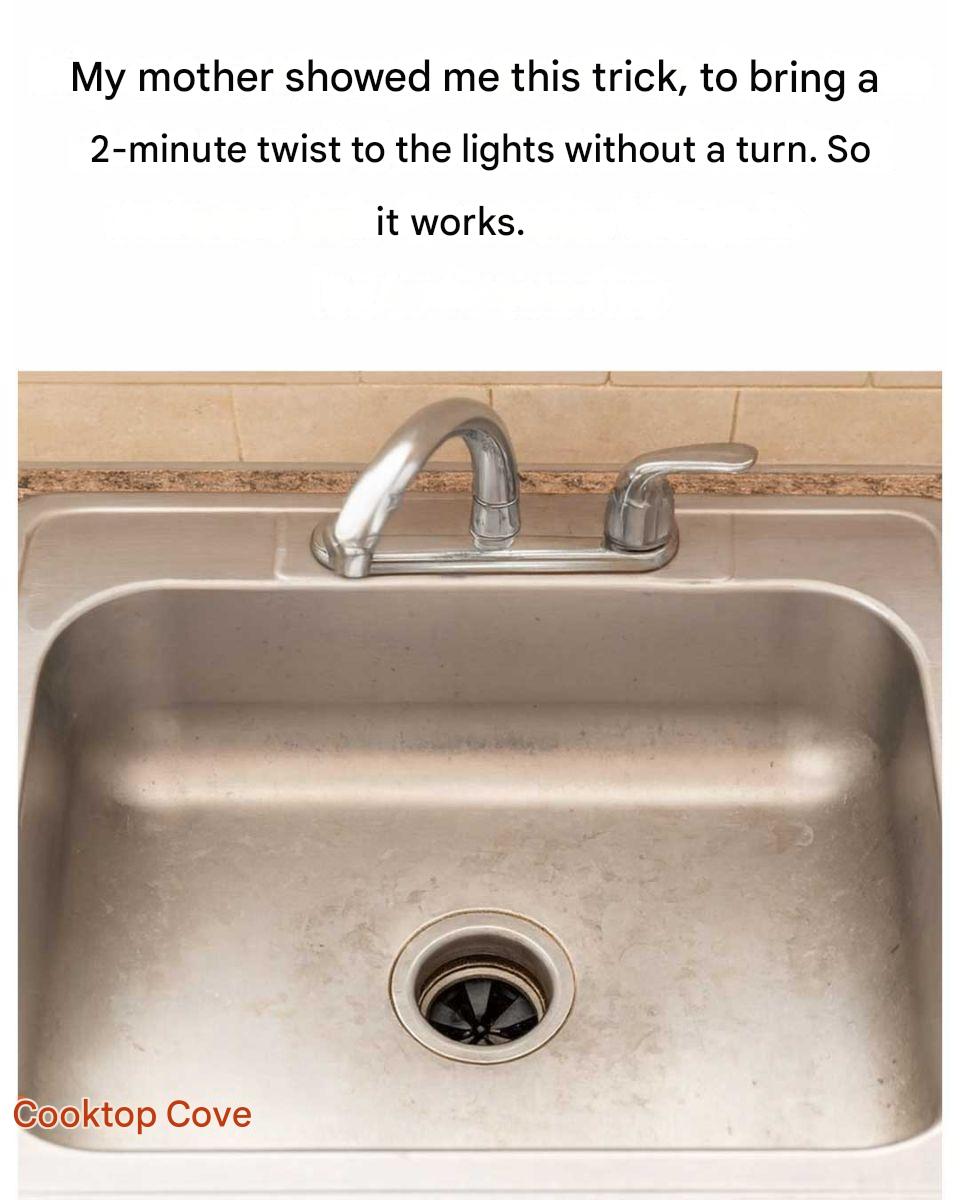The chromium in stainless steel forms a protective layer that resists rust and stains. However, harsh chemicals and abrasive cleaning methods can damage this layer, leading to a loss of shine and increased susceptibility to stains. Therefore, using gentle, non-abrasive cleaners is crucial to maintaining the shine.
3. Grandma’s Magic Trick: The Two-Minute Transformation
To use Grandma’s trick, first put half a cup of white vinegar in a spray bottle. Lightly spray the vinegar over the entire surface of the sink, making sure all areas are covered. Let it sit for about a minute.
After a minute, take a soft microfiber cloth and gently wipe the sink. You’ll notice that the vinegar has already begun to loosen any residue. With just a few wipes, your sink will look like it’s been professionally polished.
4. Zero Effort: Let the Trick Do the Work
The beauty of this trick is its simplicity and minimal effort. As the vinegar works, it dissolves stains and water spots without any scrubbing. This passive cleaning method saves time and energy, making it perfect for busy households.
With just a spray and a wipe, you’ll have a spotless, shiny sink. This hassle-free method is especially beneficial for people with physical limitations or those who prefer an effortless cleaning routine.
5. The Science Behind the Shine
The acidity of vinegar is the key to its cleaning power. The acetic acid reacts with the alkaline deposits in water spots and dirt, effectively dissolving them. This reaction allows the residue to be easily wiped away without leaving streaks.
In addition, vinegar is a natural disinfectant and helps kill bacteria and mold that might be hiding in the sink. This dual action of cleaning and disinfecting makes vinegar an excellent ally in household maintenance.
6. Common Mistakes to Avoid
Although using vinegar on stainless steel is generally safe, there are some pitfalls to be aware of. Avoid abrasive cleaners, as they can scratch the surface. Always use a soft cloth to avoid damage.
Also, never mix vinegar with bleach or other household cleaners, as this can cause harmful chemical reactions. For best results, use vinegar exclusively.
7. The environmental benefits of this trick
Vinegar is a natural, non-toxic, and environmentally friendly cleaner. Unlike commercial cleaners, which can contain harsh chemicals and pollutants, vinegar decomposes quickly and doesn’t contribute to environmental damage.
Using vinegar reduces the need for plastic packaging associated with commercial cleaners, making it an environmentally friendly choice. With this trick, you’re not only caring for your home but also making a positive contribution to the planet.
8. Comparison to Commercial Cleaners
Commercial stainless steel cleaners can be effective, but they are often expensive and contain many chemical ingredients. Vinegar, on the other hand, is affordable, versatile, and chemical-free.
While some argue that specialized cleaners provide a longer-lasting shine, vinegar is a better choice for everyday care due to its ease and safety. Its effectiveness and environmental friendliness make it a compelling alternative.
9. Testimonials: Success Stories from Others
After sharing my grandma’s trick with friends and family, I received numerous success stories. A friend struggling with limescale stains was amazed at how easily the vinegar lifted stubborn stains.
Another user praised the hack for its simplicity, noting that it transformed her sink without any muscle power. These testimonials underscore the hack’s ability to produce impressive results with minimal effort.
10. Expanding the Hack: Other Household Uses
Vinegar’s versatility goes beyond simply shining stainless steel sinks. It can also be used to clean glass, remove refrigerator odors, and even as a fabric softener in laundry.
Those looking to expand their natural cleaning options can combine vinegar with baking soda to unclog clogged drains or freshen cutting boards and countertops. Its versatility makes it a valuable addition to any cleaning arsenal.
11. Frequently Asked Questions About the Hack
A frequently asked question is whether vinegar will damage other parts of the sink, such as the faucet. Don’t worry, vinegar is safe for most fixtures when used in moderation.
Another common question concerns the smell. While vinegar has a strong aroma, it evaporates quickly and doesn’t leave a lasting scent. If necessary, a few drops of essential oil can be added to the spray bottle to mask the odor.
Advertising
Finally, many wonder if this trick is effective on heavily tarnished sinks. While it works wonders on light stains and everyday grime, heavily tarnished sinks may require repeated applications or additional scrubbing to fully restore their shine.

